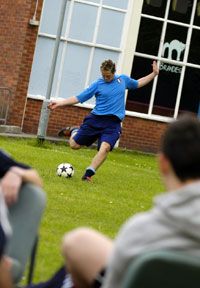5 December 2007
Formula for England football success
Give kids back their game!

SPORTS scientists at MMU believe they have the formula to cheer up England's football fans after their depressing exit from Euro 2008.
The answer lies in youth football adopting smaller teams with no referees, according to Rick Fenoglio, a coaching researcher who has worked with the FA and helped to write the coaching manual for Manchester United's academy.
Rick and his colleague Paul Cooper, a coach from Gloucestershire, believe England is failing to produce enough good footballers because children's early development is hampered by structured leagues, pushy parents and win-at-all-costs coaches.
"It's actually quite sad what we're subjecting some of these kids to. We think kids should ref themselves, especially in the younger age groups. Immediately you take the referee out of the picture, the whole atmosphere changes. It's the kids making the decisions."
Research
Fenoglio's research also shows that games ought to be small-sided, meaning not 7 but 4-a-side. He says the statistics show in 4v4 players get many more touches, passes, shots and goal scoring opportunities.
Most radically, he says that most traditional coaching techniques and drills fail to deliver because they are based upon outdated models of how young children actually acquire new skills.
"The theory goes that by repeating or practising a movement or skill, that 'pattern' becomes engrained into the player's neuromuscular football-related arsenal of skills.
"The problem arises when the player has to use the skill in the ever-changing environment of a football match. Techniques learned by the player on their own too often to do not transfer into matchplay or games."
Room to experiment
He says not only does this approach underestimate youngsters' innate ability to adapt but in copying the coach, the player will be less likely to experiment and find his own ways of manipulating his body (and the ball) in order to be successful on the pitch.
"What the FA and many academies need to realise is that if left to their own devices, the ability to be a successful problem-solver (that is, be skillful) increases dramatically. Physiologically, performing successful skills in football is a highly complex task ....one that is best learned within the ever-changing stimuli of gameplay. Hence, the dictum…Let the game be the teacher!"
Rick and Paul are leading a national campaign Give Us Back Our Game (GUBOG) to change the structure of youth football in the UK and give children a more fulfilling and enjoyable introduction to football.
See their website giveusbackourgame.co.uk.


